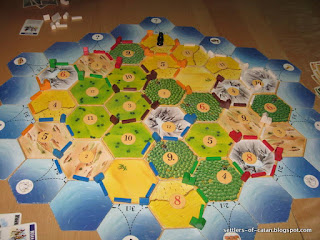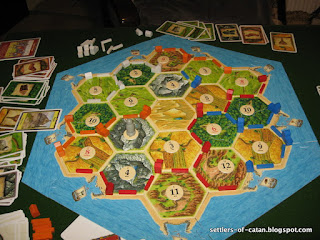There were seven of us around the Catan table last night. Actually there were eight, but two-month-old Elisabeth wasn't contending to play just yet. John and Sarah decided to play together, so we had a six-person game. Even though Tim had arrived in the early hours of that morning, and Richard and I were both extremely tired.
Tim, playing green, rolled to place first. And with the entire board at his disposal, he opted not for a standard three-resource spot, but for the 5-6-9 with two wheat and a wood. Excellent numbers, to be sure; and he was hoping to gain the wheat harbour. But not the place i would have chosen in his shoes. Which was fine, since I played second so I was able to opt for the 5-8-9 intersection incorporating ore, sheep and clay. While sheep isn't the most useful resource, I could see that both clay and ore might be in short supply, so I hoped I was well-placed for both.
Sheila (brown) was third, and took the spot I would have taken if Tim had opted for my first choice. She had the 4-8-9 on wheat, wood and clay. Jörn (blue) was next. He always likes to have ore at the beginning, so opted for two wood and ore, with 4, 5 and 11 as his numbers. The it was Richard (red). He likes to ensure an 8 and a 6 if possible - and certainly one of them. So he took the 4-6-11 with ore, sheep and clay.
Finally it was John and Sarah's turn, playing the white pieces. They were quite surprised that the 4-6-9 (two wood and a wheat) intersection was still available. I was surprised too, since that would have been my third or fourth option. The numbers were better than either Richard's or Jörn's choice - at least, if they were rolled with statistical likelihood. They were also able to take the 8-10-12 with sheep, ore and clay, thus ensuring them access (at least in theory) to all five resources, and five excellent numbers in addition to the 12.
On the way back, we all attempted to take spots that would give us the resource we lacked so far and, where possible, some new numbers. I would have liked somewhere with a 6, but there was nowhere obvious, so I plumped for reasonable access to wood and wheat. Tim, continuing in the 'ore-wheat strategy' was pleased to be able to place his final settlement on an intersection with two ore and a wood. He lacked sheep, but there were clearly going to be plenty of sheep in this game.

In the first few rounds, 6 was rolled several times, and 8 not at all. 9 didn't appear either. Nor, surprisingly, did 7. I finally bought a development card and was pleased to find that it was a street-builder; extremely useful early in the game. Tim managed to build a city rather quickly, and we all headed for our first planned spots. I took this picture when Tim and I each had four points, while everybody else was on three:

So it was a very even start to the game.
I never like to poach on other people's potential building spots if I can help it, so wasn't entirely sure where I would go next. I didn't need to think too hard, since 9 - the number which would have given me a street each time - continued to be non-existent. I did manage my first city, however, and then decided to aim for the 6-10 intersection on the coast, since I didn't have a 6 and since Tim wasn't aiming for that spot.
Gradually we were all expanding... and suddenly we noticed that Richard had, at least for now, the longest street:

Tim was just in the lead at this stage, with six points. Richard, Jörn and I each had five. John and Sarah had four, and Sheila had three.
Then Sheila built inland, blocking a potential building spot for both Richard and Jörn. I started thinking about the ore harbour, since rather a lot of 5s were being rolled. I could see that Jörn would have liked it too, but he had a few possible places. I didn't plan to take the 8-sheep spot that he was looking at.

I had drawn equal with Tim at this stage; both of us on seven points. But it could still have been anyone's game.
The next excitement was that Jörn took the longest street, although I did grab the ore harbour:

However Tim was still expanding fast. He had built all four of his cities already, plus a couple of settlements, so was well in the lead with ten solid points. Jörn and I each had eight, John & Sarah and Sheila each had six, and Richard - who was struggling to build a city - was just behind with five after he lost the longest street.
Then John and Sarah played a third knight card, and thus took the largest army and another two points. Richard managed his first city. And while everyone else kept losing cards to the robber, I was lucky - and despite having a lot of cards in my hand, did not roll a seven. So I built two streets and a settlement out to my final building spot on the not-terribly-useful spot on the desert.

So Tim was still in the lead with ten points, and I was right behind with nine. I could potentially build two more cities, and planned to buy cards as well in the hope of some victory points. John and Sarah also had nine points including the largest army; I could see that they had other hidden development cards, and wondered if they were victory points since they didn't play a fourth knight on their turn - and thus risked losing the largest army card to Sheila, who by that stage had also played three knights (and had some hidden cards too).
Jörn, who still held the longest street card, had eight points; Richard and Sheila each had six. We knew that things could change rapidly, of course....
... Which is what happened when Sheila played another couple of streets, and thus overtook Jörn's longest street.

So she now had eight points, and he was back on six.
9s were being rolled more often, which wasn't much use to me now as I didn't need any streets. So when Tim's turn came round and he monopolised clay, I wasn't too worried. He had the clay harbour, and we all assumed he was going to build another settlement on the other desert building spot. He muttered about his maths, not sure if he had calculated right...
.. and then surprised us all by placing, instead, six streets.
Not one extra point, but two as he took the longest street card, and neatly won the game.

It turned out that John and Sarah were also very close to winning, since they had two hidden victory point cards, and thus (including the largest army) eleven points.





















































